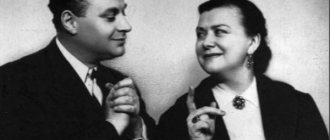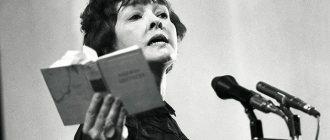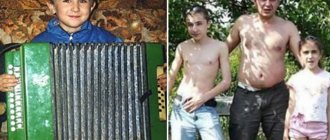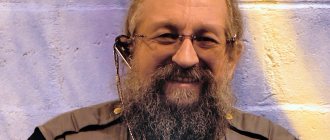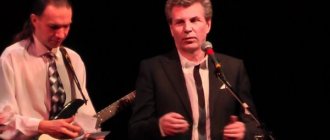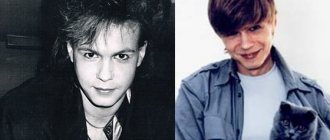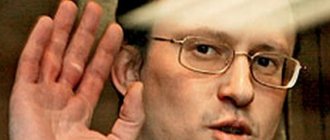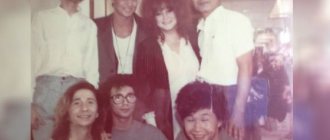Biography
Eldar Aleksandrovich Ryazanov was born in the city of Kuibyshev, today it is Samara, into the family of Alexander and Sofia Ryazanov, workers of the Soviet trade mission in Tehran. Soon the family moved to Moscow.
After graduating from ten years of study as an external student, seventeen-year-old Eldar learns from a friend about the existence of a cinematography institute and instantly makes a decision. He entered the workshop of Grigory Kozintsev on the first try, becoming the youngest VGIK student on the course.
“I had to immediately take a quick run to catch up with my classmates, adults who had life experience - some of them came from the front. My youth, inexperience, and lack of views on art were both a disadvantage and an advantage. The advantage, perhaps, was that I was essentially soft clay from which anything could be molded. I was open to any knowledge, views and theories that the Master would want to invest in me,” Ryazanov wrote.
Personal life of Eldar Ryazanov
Eldar Aleksandrovich was married three times.
The first wife Zoya Fomina was also a director. The second, Nina Grigorievna Skuibina, worked as an editor at Mosfilm. And finally, the last wife is Emma Valerianovna Abaidullina, a film editor. It was with her that the director lived in marriage until the end of his days. Ryazanov has a daughter, Olga Eldarovna Ryazanova, who graduated from Moscow State University and is a philologist and film expert. Life line. Eldar Ryazanov The daughter gave her father a grandson, Dmitry Troyanovsky. He followed in his family's footsteps by plunging into television. The grandson imagines his grandfather as completely different: “Grandfather’s favorite place on earth is Valdai, where he built a house on the very shore of the lake. He fishes and has a motorboat and a scooter there. We can say that my grandfather’s old dream of becoming a sailor has come true, at least to a small extent. In addition, he loves cars and drives them well. And every morning he douses himself with cold water...” Emma Valerianovna, when asked: “Is it easy to be with Ryazanov,” answers: “Not at all. He is too demanding of himself, and therefore of others. Too obligatory and responsible. Too efficient and indefatigable. Too honest, literally, that is, he does not know how to lie at all. In a word, you have to correspond to him all the time, and believe me, this is not easy.” Life taught him everything that Ryazanov can do. He does not believe in God, but respects believers. Eldar Ryazanov lived for his work, and for the sake of his favorite business. On November 30, 2020, Eldar Ryazanov died of acute heart failure.
"Carnival Night"
In 1955, Ryazanov came to the Mosfilm studio. Ryazanov directed the first musical comedy starring Lyudmila Gurchenko and Igor Ilyinsky at the suggestion of the then head of Mosfilm, the outstanding director Ivan Pyryev. Ryazanov himself, as he admitted, “had no desire to make a musical comedy.”
In the role of Ogurtsov, Ryazanov initially saw actor Pyotr Konstantinov. Ivan Pyryev again insisted on Ilyinsky’s candidacy. As Ryazanov recalled, members of the artistic council, having looked at the draft material, considered the upcoming comedy “gray, boring, mediocre and hopeless.”
“I didn’t think about success, about festivals and reviews, I only dreamed of not being kicked out of work and being allowed to direct another picture someday. I had no time for ambition. I had only one task - to survive,” recalled Eldar Aleksandrovich.
The comedy was released on December 29, 1956. The resounding all-Union success of “Carnival Night” - 48.6 million tickets were sold for the film - overnight made the leading actress Lyudmila Gurchenko a star.
The comedy “survived”, “survived” and for more than half a century “more alive than all the living” - invariably attracts viewers of the former USSR to the screens, and the song “Five Minutes” has actually become the anthem of the New Year.
Over the next few years, Ryazanov made comedies that became classics of Soviet cinema: “Girl without an Address” (1957), “Man from Nowhere” (1961), “Hussar Ballad” (1962), “Give me a Book of Complaints” (1964).
Family
Father - Alexander Semyonovich Ryazanov (1898-?), a native of the village of Novoye Dalneye, Nizhny Novgorod province (now the village of Novoe, Dubravsky village council, Dalnekonstantinovsky district, Nizhny Novgorod region), a participant in the Civil War, in 1921, head of the land sector of the registration department of the Field Headquarters of the Revolutionary Military Council of the Republic. In 1922, he was sent as a scout to China, then transferred to Persia. Arrested on November 14, 1937, on February 2, 1938 he was sentenced to 8 years in forced labor camps. He escaped from the camp. He was caught and ten years were added, and in total he served 17. During the war, Eldar wrote a letter to his father and received an answer with a laconic description of northern nature. In the early 1960s, the father found his son through his films. “But close contact did not work out: a complete stranger came, a man broken by life,” recalls E. Ryazanov. “He didn’t find his wife and daughter... I gave him all the money I had with me, and he disappeared for four years, not having the right to live in Moscow. After rehabilitation, he finally moved to the capital, died a few months later, and I came to his funeral.”
Mother - Sofya Mikhailovna Shusterman (married - Ryazanova, September 26, 1902 - September 1, 1969).
Stepfather (since 1934) - Lev Mikhailovich Kopp (1899-1985), civil engineer, author of textbooks and monographs “Installation of metal structures” (M.: Gosstroyizdat, 1948), “Installation of steel structures” (M.: Gosstroyizdat, 1954) , “Installation of building structures” (M.: Stroyizdat, 1968 and 1982), “Installation of metal and reinforced concrete structures” (M.: Stroyizdat, 1972; 3rd ed. - ibid., 1982).
Half-sister - Frida Lvovna Kopp (1936-1939).
Half-brother - Doctor of Geological and Mineralogical Sciences Mikhail Lvovich Kopp (born 1940), chief researcher at the Laboratory for Comparative Analysis of Sedimentary Basins, Department of Tectonics, Geological Institute of the Russian Academy of Sciences.
Nephew (son of half-brother) - Doctor of Medical Sciences, Professor Mikhail Valerievich Kopp (born 1950), oncologist, chief chemotherapist of the Ministry of Health of the Samara Region.
The first wife is Zoya Petrovna Fomina (1924-1999), director of documentaries (1950-1970s), Lenin Prize (1980).
Daughter - Olga Eldarovna Ryazanova (born 1951), graduated from Moscow State University, philologist, film expert.
Grandson - Dmitry Vitalievich Troyanovsky (born 1987), television journalist, writer.
Second wife - Nina Grigorievna Skuibina (1930-1994), editor at Mosfilm (1970-1994).
Stepson - Nikolai Vladimirovich Skuibin (born 1954), from Nina Skuibin’s previous marriage to director Vladimir Skuibin (1929-1963). A film director by profession, like his father.
Third wife - Emma Valerianovna Abaidullina (born 1941), film editor. For Emma Valerianovna this was the third marriage. The previous, second, marriage was with composer Pavel Aedonitsky (1922-2003).
Stepsons - Oleg Valeryevich Berdyugin (1964-2017) and Igor Valeryevich Berdyugin (born 1966), from Emma Abaidullina’s first marriage to designer artist Valery Berdyugin. Both took up art projects.
"Watch out for the car"
In 1966, Eldar Ryazanov’s tragicomedy “Beware of the Car” was released, which instantly became a hit. The phrases “Freedom for Yuri Detochkin!” and “They’ll screw you, but don’t steal” is still used by the whole country. Usually the main character of the film is called the Soviet “Robin Hood” Yuri Detochkin, brilliantly played by Innokenty Smoktunovsky, but no less expressive in this film is the image of investigator Maxim Podberezovikov performed by Oleg Efremov.
“Beware of the Car” was based on a story by Emil Braginsky, published in the magazine “Young Guard” in 1964. Ryazanov and Braginsky worked together on the film script. Their creative union lasted for many years.
"Irony of Fate or Enjoy Your Bath!"
In 1974, Ryazanov began filming the New Year's comedy “The Irony of Fate...”.
“Goskino and Mosfilm did not want to put the comedy into production either in a single episode or even as a short film,” recalled Eldar Aleksandrovich. And the director did not want to shorten the dialogue of the play, which he co-wrote with Braginsky, so as not to simplify the development of the characters’ relationships. It became clear that the film should be a two-part series, but “to make a two-part film about the love affairs of a spree doctor - who needs that?” Then Ryazanov had the idea to make the film for television. And the director turned out to be right in insisting on his own.
The film received the USSR State Prize and became the most popular in the history of Soviet and Russian cinema. Zhenya Lukashin and Nadya, performed by Andrei Myagkov and Polish actress Barbara Brylska, were so loved by the audience that for 40 years not a single New Year's feast has been held without them throughout the Soviet and post-Soviet space.
In the period from the mid-70s to the early 80s, Ryazanov filmed “Office Romance,” “Garage,” “Station for Two,” “The Incredible Adventures of Italians in Russia,” “Say a Good Word for the Poor Hussar.” The comedies of the creative tandem Ryazanov-Braginsky invariably break all records at the box office.
In the 1980-1990s, Ryazanov made films: “Cruel Romance”, “Forgotten Melody for Flute”, “Dear Elena Sergeevna”, “Promised Heaven”, “Prediction”, “Hello, Fools!”, “Old Nags”. And “Quiet Whirlpools” became the last film created by Ryazanov in collaboration with Braginsky; in 1998, the playwright passed away.
In 2006, the director’s film “Andersen” was released. Life without love”, which won the Grand Prix of the XV Russian festival “Vivat, Cinema of Russia!” - Audience Award and Press Award.
Ryazanov’s last work was a remake of “Carnival Night” - “Carnival Night 2, or 50 Years Later,” which premiered on January 1, 2007.
In total, Eldar Ryazanov directed 24 comedies, co-wrote the scripts for many of his films, and wrote several plays.
Childhood and youth
The master of Soviet and Russian cinema, Eldar Ryazanov, was born in Samara. The future director was born on November 18, 1927 in a family of high-ranking trade workers. Dad Alexander Semenovich Ryazanov and mother Sofya Mikhailovna Shusterman worked at the Soviet trade mission in Tehran, and Eldar Ryazanov spent his early childhood there. After 3 years, the family returned to Moscow. My father was appointed head of the wine department.
The mother’s Jewish nationality, as Ryazanov later said, did not create problems either in her personal life or in her work. And for the creation of the fairy tale film “Andersen. Life without love” Eldar was prompted by a detail in the writer’s biography: for the last 15 years he lived in the house of wealthy Jews Melchior. The director wanted to offer the main role to Innokenty Smoktunovsky, then to Adrien Brody. As a result, Sergei Migitsko starred.
Soon after moving to the capital, Ryazanov’s parents separated. The boy stayed with his mother. When Eldar was 7 years old, his mother got married. The stepfather took up raising the boy. The relationship was immediately good. Eldar Ryazanov hardly remembers his own father. When he left the family, his son was 5 years old. Soon the father married a second time and had a daughter. And in 1938, Alexander Ryazanov was sentenced to 17 years. His life ended tragically.
Eldar Ryazanov
Published by Pavel Kartashev Sunday, December 13, 2015
Eldar Ryazanov in childhood
From early childhood, the boy loved to read and dreamed of distant travels. Therefore, he chose two paths for himself: either become a writer and create interesting books himself, or learn to be a navigator and travel. Eldar even wrote a letter to the Odessa Mariner, asking them to tell him what they needed to make their dream come true. But at this time the Great Patriotic War broke out. Dreams of travel had to be put on hold for a long time. And the beloved home library was sold out or exchanged for food.
After school, Eldar Ryazanov entered VGIK. He didn’t dream of becoming a director, he just took the documents to the university with a friend. At the directing department, the mentor of Ryazanov’s course was the famous Grigory Kozintsev, who at that time directed the legendary films “The Overcoat”, “S. V.D.” and "New Babylon". Eldar was 16 years old when he became a student.
At first, the young man didn’t really want to study, and he didn’t have enough life experience. This almost caused him to be expelled. Showing resourcefulness, the guy stayed and soon met and even exceeded the teachers’ expectations. Sergei Eisenstein himself, who was working as a teacher at VGIK at that time, noted Ryazanov as one of the most capable students.
In 1950, Eldar Ryazanov graduated from the institute with honors. The graduation film was called “They Study in Moscow.”
Titles and awards
- 1984 - People's Artist of the USSR
- Awarded the USSR State Prize (1977, for the film “The Irony of Fate, or “Enjoy Your Bath!”) and the State Prize of the RSFSR named after the Vasilyev Brothers (1979, for the film “Office Romance”)
- Awarded two Orders of the Red Banner of Labor, Orders of Friendship and “For Services to the Fatherland” III (1996) and II (2008) degrees
- Awarded the French Order of Fine Arts and Letters and the Order of the Legion of Honor for the series of programs “Parisian Secrets” (1998).
- The director was a prize-winner at the International Film Festivals in Madrid (Grand Prix of the Madrid Film Festival), Delhi (Golden Peacock), Brussels and others.
- Winner of the Nika, Golden Ostap, Golden Duke, TEFI awards, and the Russian independent Triumph award (2007).
- On January 13, 2002, the solemn ceremony of laying the star of Eldar Ryazanov took place on the Square of Stars of the Russian Film Alley.
Filmography: Director
- Carnival night-2, or 50 years later (2007)
- Andersen. Life without love (2006)
- Bedroom Key (2003)
- Desired (2003), TV series
- Old nags (2000)
- Still waters (2000)
- Hello, fools! (1996)
- Prediction (1993)
- Promised Heaven (1991)
- Dear Elena Sergeevna (1988)
- Forgotten Melody for flute (1987)
- Cruel Romance (1984)
- Station for two (1982)
- Say a word for the poor hussar (1980)
- Garage (1979)
- Office Romance (1977)
- Irony of Fate or Enjoy Your Bath! (1975)
- The Incredible Adventures of Italians in Russia (1973)
- Old Robbers (1971)
- Zigzag of Fortune (1968)
- Beware of the Car (1966)
- Give me a book of complaints (1964)
- Hussar Ballad (1962)
- Nowhere Man (1961)
- Quite Seriously (1961)
- Girl with no address (1957)
- Carnival Night (1956)
- Spring Voices (1955)
Ryazanov, Eldar Alexandrovich
Youth
Eldar Ryazanov was born in Samara, his mother’s hometown, in the family of workers of the Soviet trade mission in Tehran, Alexander Semenovich Ryazanov and Sofia Mikhailovna (nee Shusterman), in a house on Frunze Street, 120[4][5].
Soon the parents moved to Moscow, where the father worked as the head of the wine department[6]. In 1930, the family broke up, and from the age of seven Ryazanov was raised by his mother and stepfather, engineer Lev Mikhailovich Kopp, a widower who treated Eldar as his own son[7][8].
Since childhood, I loved literature, wanted to become a writer, and dreamed of traveling. After graduating from ten years of school, I sent a letter of application to the Odessa Naval School.
First works
In 1950 he graduated with honors from VGIK (Grigory Kozintsev’s workshop). His diploma work was the documentary “They Study in Moscow,” filmed together with classmate Zoya Fomina. For five years he worked in documentary films at the Central Documentary Film Studio. He filmed stories for the film magazines “Pioneerism”, “Soviet Sport”, “News of the Day”, and edited several issues in their entirety. He also made film essays “The Road named after October” (with Liya Derbysheva, 1951), “For the World Chess Championship” (1951), “Sakhalin Island” (with Vasily Katanyan, 1954) and others.[9]
Since 1955 he worked as a director at the Mosfilm film studio. Together with Sergei Gurov, he directed the first Soviet wide-screen film revue, “Voices of Spring,” which also included live-action episodes.
Eldar Aleksandrovich’s first film (“Carnival Night”), released on the big screen in 1956, brought the director all-Union fame.
Over the next few years, he directed the lyrical comedy “Girl Without an Address” (1957), the heroic comedy “The Hussar Ballad” (1962), the everyday comedy “Give me a book of complaints” (1964), and the eccentric comedy “The Incredible Adventures of Italians in Russia” (1973). In 1961, he made two satirical films: “How Robinson was Created” (based on the story of the same name by Ilf and Petrov, a short story in the comedy anthology “Quite Seriously”) and “The Man from Nowhere” (1961, almost never released at the box office due to a censorship ban). “Man from Nowhere” featured Sergei Yursky and Anatoly Papanov.
In the creation of the film “The Hussar Ballad”, Pyryev again provided great assistance to the film director, who obtained permission for the production and persuaded him to star in the role of Lieutenant Rzhevsky
Yuri Yakovlev.
The film director himself had to make enormous efforts to convince the film bosses that Ilyinsky was the best candidate for the role of Kutuzov, that the film did not distort Russian history, but romanticized it. [ source not specified 158 days
] Alexander Gladkov’s play “A Long Time Ago,” which served as the dramatic basis for the film, he shortened it, at the same time he had to add several poetic episodes.
In the 1960s, a team of creative, like-minded film director began to take shape. [ source not specified 158 days
] This is screenwriter Emil Braginsky, composer Andrei Petrov and cameraman Vladimir Nakhabtsev, as well as actors:
- Liya Akhedzhakova,
- Oleg Basilashvili,
- Georgy Burkov,
- Valentin Gaft,
- Evgeniy Evstigneev,
- Andrey Mironov,
- Andrey Myagkov,
- Anatoly Papanov,
- Olga Aroseva,
- Svetlana Nemolyaeva,
- Valentina Talyzina,
- Lyudmila Gurchenko,
- Yuri Yakovlev,
- Alisa Freindlich,
- Larisa Golubkina.
Main directorial works
There is an opinion that one of his best films is “Beware of the Car” (1966). [ source not specified 158 days
] Despite the fact that the film was based on an urban joke about a noble car thief, all life conflicts, characters and dialogues were accurately described in it. The widest audience was also attracted by the further works of the film director:
- "Zigzag of luck"
- "Old Robbers"
- “The Incredible Adventures of Italians in Russia” (1973),
- "Irony of Fate or Enjoy Your Bath!" (1975, TV movie),
- "Love affair at work",
- "Station for two"
- “Cruel Romance” (based on the play “Dowry” by A. N. Ostrovsky); the latter caused heated controversy in the press[10][11][12][13][14][15].
A certain line has been drawn in the film director’s work [ source not specified 158 days
] films “Garage” and “Put in a Word for the Poor Hussar” (television film): both films are sharply critical of Soviet reality.
Not all plans were realized. In the late 1960s, Ryazanov planned to make a film about Cyrano de Bergerac based on the heroic comedy of Edmond Rostand and in the likeness of his “Hussar Ballad.” Having tried many popular actors for the main role (Andrei Mironov, Oleg Efremov, Sergei Yursky, Vladimir Vysotsky and others), the director eventually approved Evgeny Yevtushenko. He successfully passed the screen test, but higher authorities closed the project due to the social activities of the famous poet[16].
Late period
In the 1980-1990s, Ryazanov worked just as intensively [ source not specified 158 days
] as before. He co-authored many of his scripts, wrote several plays, and published a number of books. In the 1980s, the director planned his own film production of Mikhail Bulgakov’s novel “The Master and Margarita,” for which high-ranking ideological officials did not give permission[17].
From 1979 to 1985 he worked as the host of the TV show “Kinopanorama”[18]. He created more than 200 original television programs [ source not specified 158 days
].
The most popular television series have become: [ source not specified 158 days
] “Eight Girls, One Me”, “Snow White and the Seven Dwarfs”, “Conversations in the Fresh Air”, “Let’s Talk about the Oddities of Love” (a series of programs about outstanding people), “ Parisian secrets of Eldar Ryazanov" (ORT) (which included Ryazanov’s interviews with Jean Marais, Brigitte Bardot, Pierre Richard, Roman Polanski and Patricia Kaas).
He was a member and (in 1988-1990) secretary of the board of the Union of Cinematographers of the USSR under the first secretary Andrei Smirnov.
In 1980-1984 he led workshops for comedy film directors at the Higher Courses for Scriptwriters and Directors[19][20]. Among his students are directors Yuri Mamin, Ivan Dykhovichny, Evgeny Tsymbal, Isaac Friedberg.
He was a member of the jury at the final game of the KVN Major League in 1987.
In 1993, the author’s program “Men’s Conversation between Eldar Ryazanov and Boris Yeltsin”[21] was released and shown on television[21], during which the president answered the film director’s pressing questions[22]. The broadcast took place on Ostankino Channel 1, and was produced by the television company REN-TV[23][24]. The re-broadcast took place on April 25, 2007 on the REN TV channel and was timed to coincide with Yeltsin’s funeral[25].
In 2002, Ryazanov became president of the Russian Academy of Cinematographic Arts "Nika".
On January 23, 2005, the film club (later the film club-museum) “Eldar” opened, conceived, in the words of the director himself, as a kind of center for Russian comedy[26]. In three halls, the largest of which seats more than five hundred, films and performances are shown, creative meetings and concerts are held[27][28].
He was a member of the Union of Cinematographers of Russia. In 2010 he became one of the founders of the Cinema Union[29].
Public position
In 1989, he was nominated as a candidate for people's deputies of the USSR from the Gagarin electoral district of Moscow (Ramenki, Solntsevo, Peredelkino). [ source not specified 196 days
]Went through the same electoral district with Yuri Chernichenko and several other candidates.[
source not specified 196 days
]Could not guarantee voters that a metro line would be built in Solntsevo, and called on his supporters to vote for Chernichenko, who as a result won the elections in the district .[
source not specified 196 days
]
At the beginning of 1993, he publicly supported Russian President Boris Yeltsin, calling for people to vote for confidence in him during the 1993 referendum [ source not specified 158 days
]
On the night of October 3-4, 1993, speaking on RTR, Ryazanov condemned the decision of the Constitutional Court to lift the ban on the activities of the primary organizations of the Communist Party of the RSFSR (CPRF) and called supporters of the Supreme Council “communist degenerates”, “bastards”. He also compared the CPSU with the NSDAP[30].
In January 1996, he was among the cultural and scientific figures who called on the Russian authorities to stop the war in Chechnya and move on to the negotiation process[31]. In March-June of the same year, together with his friend Zinovy Gerdt and parodist Alexander Ivanov, he actively campaigned for the election of Boris Yeltsin as President of Russia for a second term. [ source not specified 196 days
]
In an interview with the Ekho Moskvy radio station in 2011, he gave a predominantly positive assessment of the activities and personality of Boris Yeltsin, and called the appointment of Vladimir Putin as his successor the biggest mistake of the ex-president[32]. In the same year, together with other cultural figures and human rights activists, he signed an open letter demanding that all political forces in the country be allowed to participate in the elections[33].
He spoke out against the criminal prosecution of those involved in the Yukos Case[34] and members of the Pussy Riot group[35]. He called on Muscovites to take part in protests against Federal Law No. 272 (the so-called “Dima Yakovlev Law”), which banned the adoption of Russian children by US citizens[36]. In March 2014, together with his wife, he signed an open letter published by KinoSoyuz condemning the “Russian military intervention in Ukraine” and the “unprecedented anti-Ukrainian campaign launched by Russian state channels”[37]. He supported the holding of a congress of intellectuals in Moscow “Against war, against self-isolation of Russia, against the restoration of totalitarianism” and signed an appeal from the congress, which condemned the annexation of Crimea to Russia.[38] He also signed an appeal by Russian cultural figures against the policies of Russian President V.V. Putin towards Ukraine[39]. Ryazanov’s name and surname were included by the Ukrainian authorities in the so-called “white list” of cultural and artistic figures from different countries who supported the territorial integrity and sovereignty of the country[40].
Over the years, he has consistently advocated for the protection of animals[41]: for the adoption of the relevant federal law[42], investigation of cases of cruelty[43], creation of circuses without acts with training[44]. He supported the candidacy of environmental activist Evgenia Chirikova in the 2012 mayoral elections in Khimki[45].
last years of life
Grave at Novodevichy Cemetery, Moscow, 2020.
In 2010 and 2011, he underwent heart surgery and has since been hospitalized more than once[46]. At the end of 2014, Ryazanov was diagnosed with acute cerebrovascular accident; at the beginning of August of the following year he suffered a heart attack, which, as the media reported, led to pulmonary edema[46][47].
On October 6, 2020, he was hospitalized in the intensive care unit of the Moscow City Clinical Hospital No. 1 named after. N.I. Pirogov[48]. I celebrated my birthday on November 18 at home. Three days later he was hospitalized again[46].
Eldar Ryazanov died in a Moscow hospital on the night of November 29-30, 2020 from acute heart failure[49][50][51].
The farewell took place on December 3 at the Central House of Writers[52]. On the same day he was buried at the Novodevichy cemetery[53].
Filmography: Actor
- The Irony of Fate. Sequel (2007)
- Carnival night-2, or 50 years later (2007)
- Andersen. Life without love (2006)
- Bedroom Key (2003)
- Old nags (2000)
- Still waters (2000)
- Hello, fools! (1996)
- Promised Heaven (1991)
- Dear Elena Sergeevna! (1988)
- Forgotten Melody for flute (1987)
- Station for two (1982)
- Say a word for the poor hussar (1980)
- Garage (1979)
- Risk is a Noble Cause (1977)
- Irony of Fate or Enjoy Your Bath! (1975)
- The Incredible Adventures of Italians in Russia (1974)
- Old Robbers (1971)
- Give me a book of complaints (1965)
- The Purpose of His Life (1957)
Filmography: Screenwriter
- Andersen. Life without love (2006)
- Bedroom Key (2003)
- Old nags (2000)
- Hello, fools! (1996)
- Prediction (1993)
- Promised Heaven (1991)
- Dear Elena Sergeevna (1988)
- Forgotten Melody for flute (1987)
- Cruel Romance (1984)
- Station for two (1982)
- Say a word for the poor hussar (1980)
- Garage (1979)
- Office Romance (1977)
- Irony of Fate or Enjoy Your Bath! (1975)
- The Incredible Adventures of Italians in Russia (1973)
- Old Robbers (1971)
- Zigzag of Fortune (1968)
- Beware of the Car (1966)
- Hussar Ballad (1962)
- Quite Seriously (1961)
